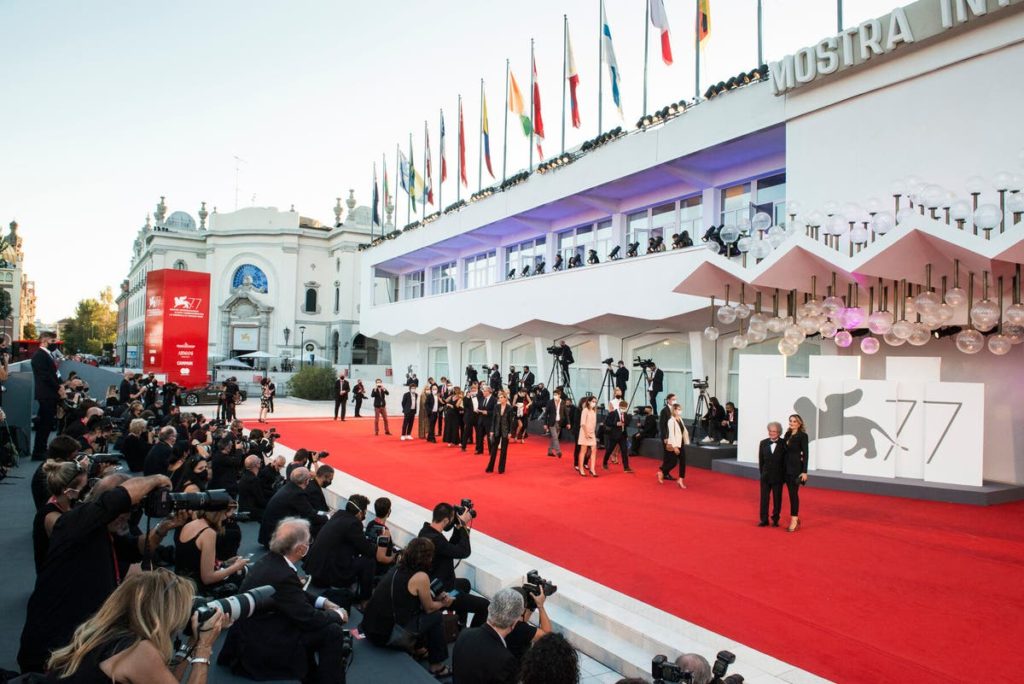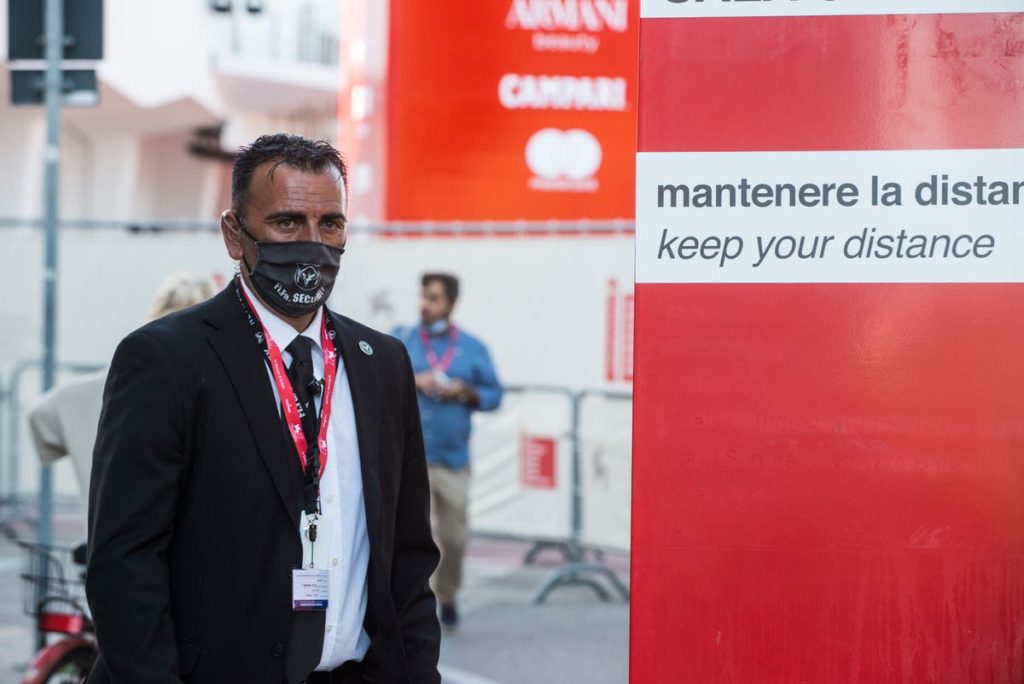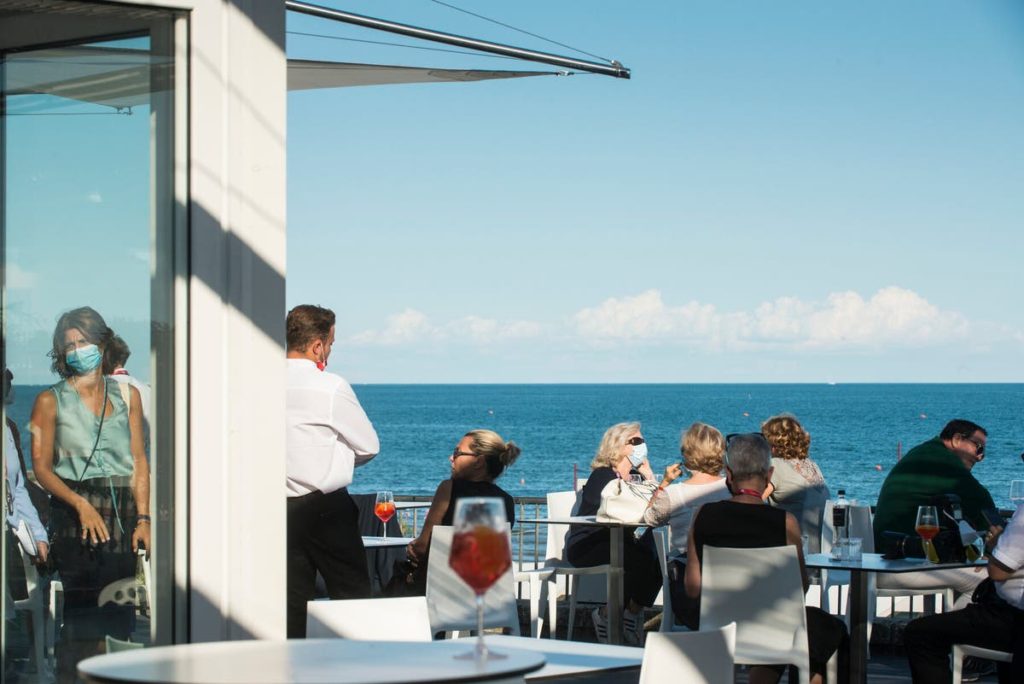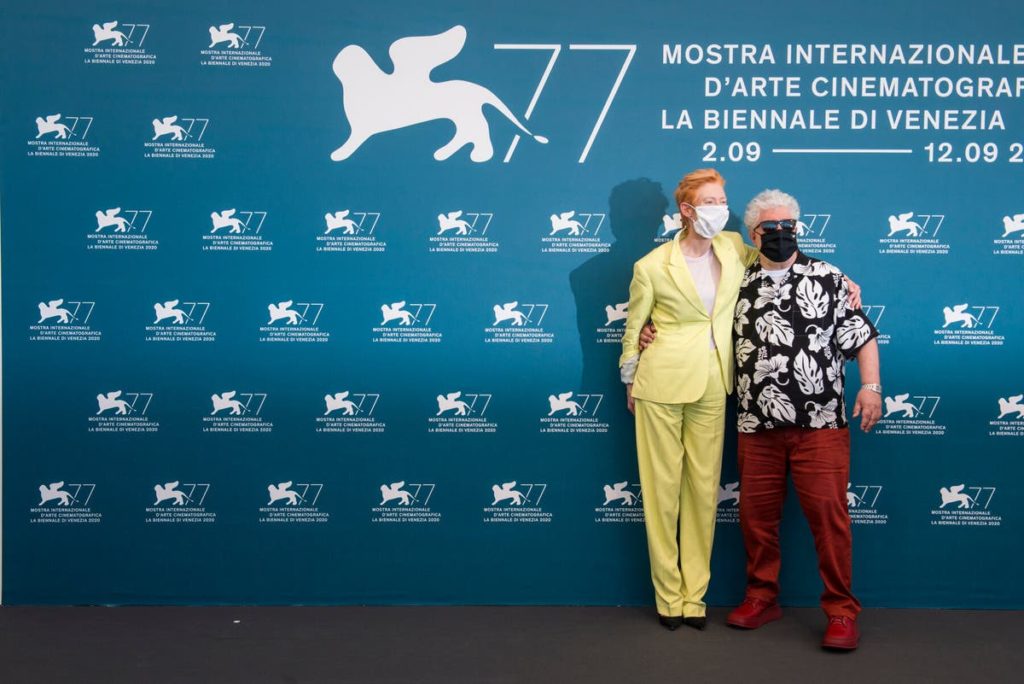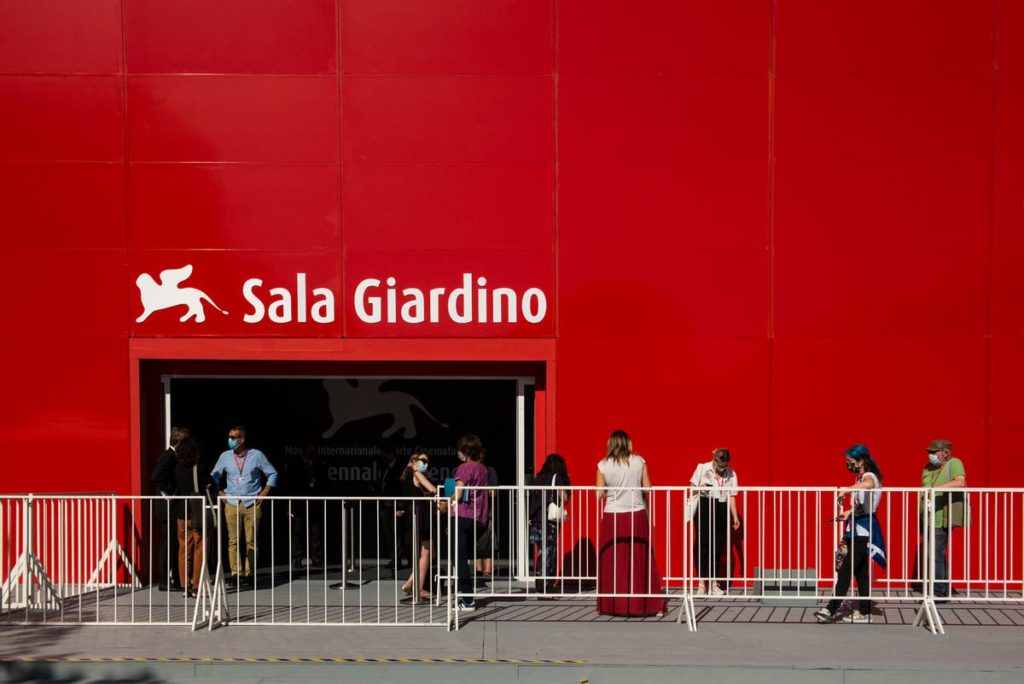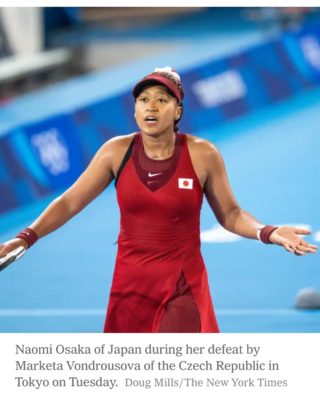Strict measures are in place at the first major international movie event since the coronavirus pandemic began.
VENICE — Most of the movie fans attending this year’s Venice Film Festival haven’t been inside a theater for months.
“I got really emotional walking into the first screening, with people from all over the world celebrating cinema,” said Laura Pritchard, 54, a British writer and script editor who lives here. “I sobbed.”
The only distraction from this intense moment, she said, was the mask she was wearing. “They’re not so effective when a film makes you cry and they get covered in tears,” she said, laughing.
The 77th edition of the festival, which opened Wednesday and runs through Sept. 12, is the first major international film event to take place since the coronavirus closed down movie theaters, film sets and public gatherings across the globe.
The world’s oldest film festival, Venice has in recent years gained a reputation for launching Oscar-winning movies like Todd Phillips’s “Joker” (2019), Yorgos Lanthimos’s “The Favourite” (2018) and Damien Chazelle’s “La La Land” (2016). Visitors this year are required to wear masks not just in screening rooms, but throughout the enclosed festival site, which includes outdoor seating areas, cafes and restaurants.

Face masks are required throughout the festival site. Susan Wright for The New York Times
Other strict virus-prevention measures are also in place, with hand sanitizer stations at building entrances and accredited delegates’ movements inside festival buildings tracked with scanned passes in case of an outbreak. Temperatures are checked on the way into screenings, and empty seats are mandatory between spectators.
In many ways, the socially distanced movie theater experience is a comfortable one: There’s room to stretch out, monopolizing the arm rests comes without guilt and you can stretch your legs out luxuriously. The communal experience of reacting to the big screen remains, just with more personal space.
There are almost twice the usual number of screenings to accommodate smaller, socially distanced audiences, and the festival has two new outdoor screening spaces: one atop a skating rink on the Lido, a thin island on the Venetian lagoon; and another in gardens on Venice’s main island. (Thankfully, the weather for the first few days of the festival has been dry and mild.)
Festival staff members were alert — if a little inconsistent — in enforcing the mask rule, telling low-riding wearers to pull them over their noses. At the outdoor seating areas this week, however, visitors abandoned their masks to eat, drink and smoke. As sunglasses-clad attendees discussed movies and sipped Aperol spritzes, the coronavirus seemed, for a moment or two, quite far away.

Festival attendees on the terrace of the Palazzo del Casinò on Thursday. Susan Wright for The New York Times
“Having to wear masks even during screenings is a nightmare,” said Marianna Serandrei, 54, a Venice native who has been attending the festival since she was a teenager. But “human beings can actually get used to basically anything,” she said, adding that she would tolerate wearing a mask if it meant being able to continue her annual festival tradition of seeing up to three films a day.
Unlike in the United States, where mask wearing has become a divisive political issue, Italians are generally complying with the rules. But before the festival began, it appeared that face coverings could become a contested theme.
On Aug. 25, the organizers announced that Cristi Puiu, a Romanian filmmaker who had been invited to sit on the competition jury, would stand down after “unexpected difficulties” arose. He has been replaced by the American actor Matt Dillon.
The festival’s spokeswoman said that Puiu was not attending for “personal reasons,” but many news media outlets speculated that the decision had been influenced by a speech he gave when introducing his new film, “Malmkrog,” onstage at the Transylvania International Film Festival last month.
According to local media reports, Puiu said it was “inhuman” to force audience members to wear masks to watch the movie, which is 200 minutes long. He did not respond to a request to comment for this article.
This year’s lineup includes films from more than 50 countries, and for the first time in a decade, the opening film was from Italy: Daniele Luchetti’s “Lacci,” a twisty marriage drama set in Naples. Pedro Almodóvar’s new short film, “The Human Voice,” starring Tilda Swinton and based on a play by Jean Cocteau, was on view this week, and later in the festival the much anticipated “Nomadland,” from Chloé Zhao and “One Night in Miami,” Regina King’s directorial debut, will premiere.

Tilda Swinton and Pedro Almodóvar in Venice on Thursday. The two have collaborated on a new short film, “The Human Voice.” Susan Wright for The New York Times
But with travel to Italy from the United States still restricted and the event’s usual Hollywood star power dimmed, this year’s festival has an especially European feel.
This was emphasized by Alberto Barbera, the festival’s artistic director, who invited directors from seven major European film festivals — including Thierry Frémaux of Cannes — to open the event. Many of these festivals, like Cannes, won’t have in-person events this year, although Spain’s San Sebastián Film Festival will go ahead this month and the Czech Republic’s Karlovy Vary International Film Festival is slated for November. At a news conference on Wednesday, Barbera called the other directors’ presence at Venice an expression of solidarity.
Film festival leaders usually compete — for films, for jury members — but this year has seen a more collaborative approach, Barbera said.
“Watching movies on streaming services has helped us survive over the last few months,” he said, but “the risk is that we have a progressive reduction of the role of theater cinema in the film industry.”
Across the world, movie theaters are starting to reopen after being closed for months, and again and again on the festival’s stages, stars and administrators made the case for the big screen. At the opening ceremony, Cate Blanchett, the president of the competition jury, said that “cinema comes alive when it’s an event.”

The Sala Giardino, one of the festival’s screening rooms. Susan Wright for The New York Times
Swinton, the British actress who was presented with the Golden Lion award for lifetime achievement on Wednesday, said in her acceptance speech that to be in “a room with living creatures and a big screen” was “pure joy.”
This sentiment was shared by festival attendees. Patty Thompson, 74, an American who lives in Venice, said that she had booked her tickets months ago and that there were benefits to the festival’s new setup. The new online booking system had “taken all the stress out of it,” she said. “And you don’t have to stand for a long time in the sun waiting for the box office.”
The coronavirus hit Italy early, and hard, resulting in more than 35,000 deaths to date. The country went into a strict lockdown at the end of March, and Venice, usually overrun with international tourists, was nearly empty.
It was “very tough,” said Serandrei, the festival regular, who runs two hotels in the city. Now, with travel restrictions to Italy lifted from many European countries, visitors are trickling back, posing for photos on bridges and taking expensive gondola rides.
The film festival created a buzz that residents said they appreciated after months of deserted streets.
“During the height of the quarantine, Venice, for all its beauty, was dead,” Pritchard said. “Any return to life feels like a good thing. Even if they’re buying plastic junk!”
FEATURED IMAGE: Stars arriving at the Palazzo del Cinema on Thursday for a Venice Film Festival screening. Susan Wright for The New York Times
By Eleanor Stanford/ The New York Times

